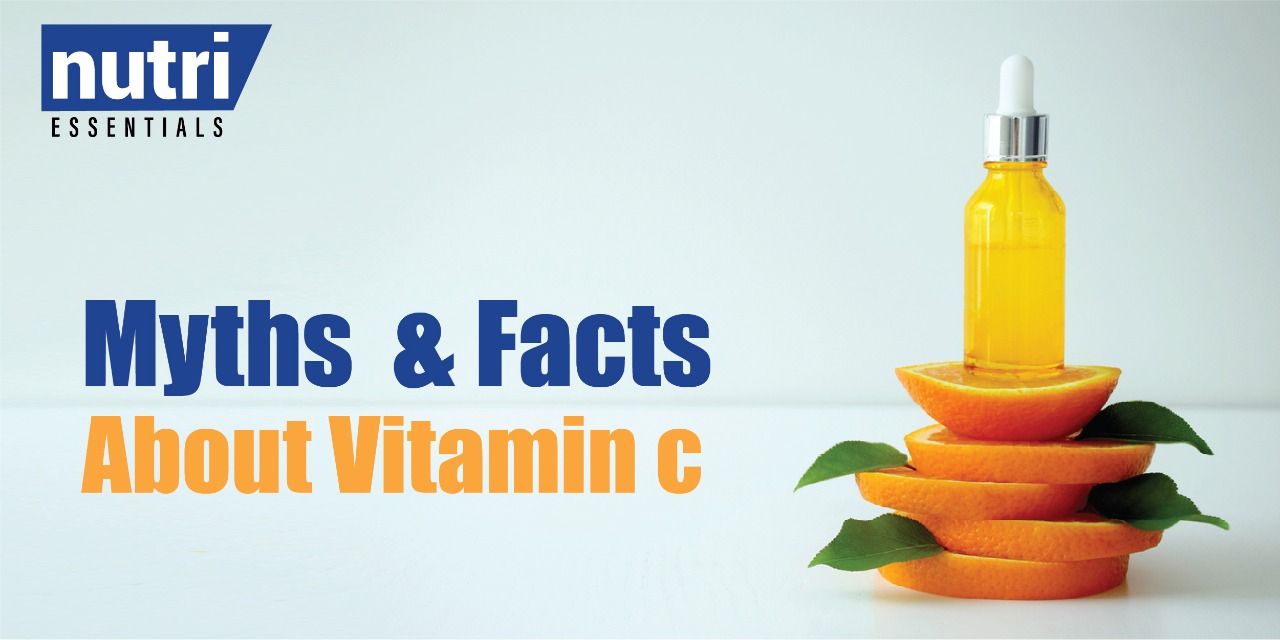Quality products for you & your family to stay ahead in life.

Today, vitamins and supplements are more popular than they have ever been. But are they really what we hear about them? In this edition of Myths & Facts about Vitamin C, we address a bunch of misunderstanding and some fun facts.
There’s no doubt that vitamin C is good for boosting your immunity. But there are many other important functions performed by Vitamin C. from boosting collagen production, wound healing, preventing gum bleeding, taking care of your skin & hair to improving the overall energy in your body. But sadly most of us can relate vitamin C with immunity only.
But myths about this essential nutrient are also very common. So here are a few myths busted and facts stated about this common yet fascinating nutrient.
• Myth – Vitamin C is Only Beneficial for Boosting Immunity.
Fact – There’s no doubt that Vitamin C is essential for boosting your immunity. But as mentioned above, it performs other functions in our body – boosting collagen production, wound healing, preventing gum bleeding, taking care of your skin & hair to improving the overall energy in your body.
Vitamin C is also one of the most potent antioxidants, which helps in fighting free radicals to ward off inflammation and disease.
Vitamin C plays a major role in wound healing as it regenerates collagen in the skin and other tissues. This means it is also beneficial for healing wounds and injury scars.
Vitamin C is also an essential co-factor for collagen production, so a healthy
intake will keep your skin smooth; maintain its elasticity, luminous and youthful appearance.
Vitamin C also improves cardiovascular health by lowering blood pressure and cholesterol level. It also helps to keep blood vessels elastic.
• Myth – Citrus Fruits are Best Source of Vitamin C.
Fact – Contrary to popular belief, that citrus fruits like oranges, lime, etc. do not top the list of the richest sources of vitamin C. A vegetable — bell peppers — comes out on top. One cup of chopped raw red bell pepper (about the size of a tennis ball) packs 200 to 300 milligrams of vitamin C, about 100 more than a cup of OJ. Other good sources include broccoli, Brussels sprouts, kiwi, strawberries, papaya, pineapple, and cantaloupe, as well as (of course) citrus fruits, like oranges, tangerines, and grapefruit.
• Myth – The More Vitamin C, the Better.
Fact – many studies have shown that high doses of Vitamin C are beneficial. Anything up to 500mg a day will be absorbed and tolerated by the body.
However, any surplus (more than 1000mg/day) will be lost in urine because vitamin C is water – soluble. Hence, there are no really dangerous side-effects from taking too much Vitamin C – only mild flatulence and occasionally diarrhea.
• Myth – No Need to Daily Doses.
Fact – Being water – soluble nutrient, vitamin C can’t be stored in the body. And any surplus quantity will be lost in urine so it is almost impossible to overload your system. If you do happen to consume too much Vitamin C at once, you will just excrete by urination. Hence it is essential to get your daily dose of Vitamin C through diet or supplement, to see the beneficial effects. This also means that you cannot take a mega dose of this vitamin once a week or month and expect it to have residual effects. But what you can do is order your pack of Vitamin C Effervescent Tablets, for your daily dose of Vita min C.
• Myth – Vitamin C Wards Off Cold & Flu.
Fact - Now that cold and flu season is officially ramping up, a lot of people are stacking up on vitamin C supplements to avoid getting sick. But sadly, that may not be as beneficial as you might think.
Studies shows that people who regularly take vitamin C supplements may have a shorter duration of colds with milder symptoms, but it does not reduce the risk of catching a common cold. However, some studies also suggest that vitamin C supplements reduce the duration of colds in the general population.
• Myth – All Vitamin C Supplements Are Same & have Equal.
Fact – Supplements are one way to get a daily dose of vitamin C. And there is not contrary that a whole-food-based natural vitamin C supplement is always superior to synthetic vitamin C supplements. Because synthetic vitamin C supplements have lower bioavailability than real foods, which means you cannot absorb them nearly as well. Contrariwise, real vitamin C as found in real natural whole food is accompanied by a complex of many other naturally occurring phytonutrients. As such, the body’s vitamin C requirements are best met from foods rich in this nutrient.
To help tackle daily challenges of immune boosting, Nutriessentials Vitamin C Effervescent Tablets are nutrition supplements made using comprehensive immune booster vitamins. Each effervescent supplement tablet of 1000 mg ascorbic acid contains Vitamin C equivalent to over 20 lemons.

